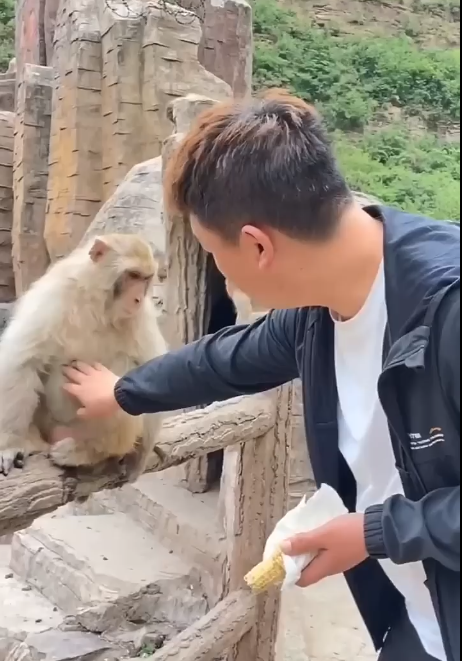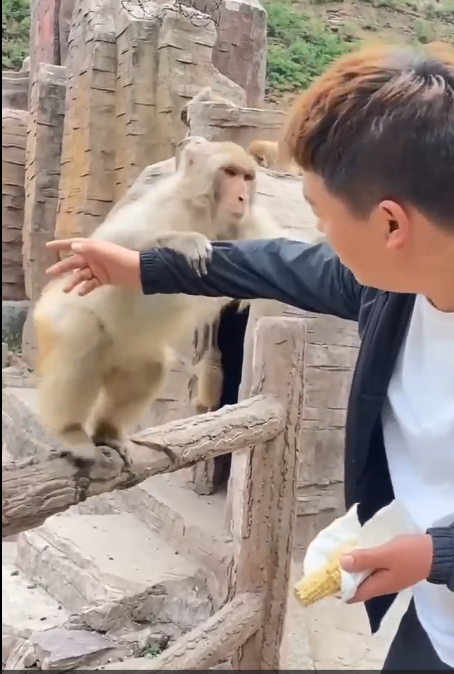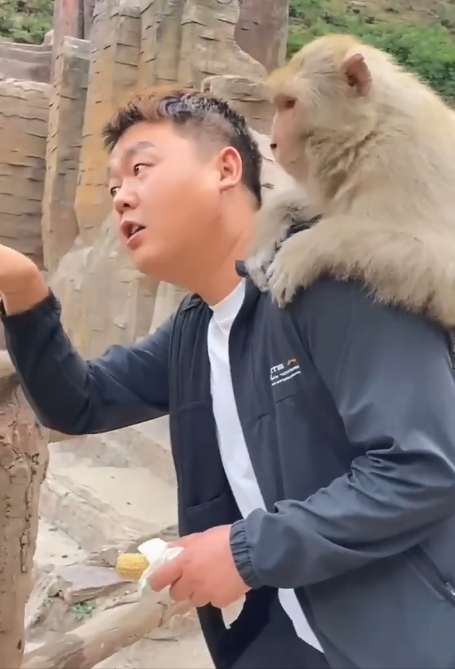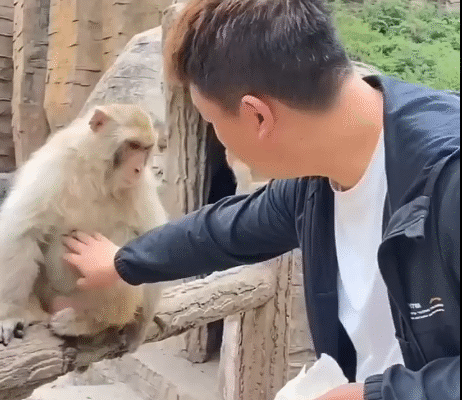
In the heart of a lush green jungle, where the golden rays of morning sunlight pierced through the thick canopy, there lived a monkey unlike any other. His name was CUTIS, but among the animals—and even some villagers who lived nearby—he was known as “The Monkey King.” Not because he ruled by power or strength, but because of his cleverness, courage, and charisma. Every creature admired him. He could swing faster than the wind, leap higher than the tallest tree, and think quicker than anyone else. Some even joked that CUTIS wasn’t just a monkey anymore—he had become a spirit of the forest, a living legend who brought laughter and lessons wherever he went.
But before we get too carried away, one thing must be made clear: please do not imitate the Monkey King’s moves! What looks playful and magical for a monkey could be very dangerous for humans. His agility came from years of swinging, climbing, and surviving in the wild—not from tricks or training. So while his adventures may make you laugh or gasp in awe, remember that the Monkey King’s world was built for him alone.
CUTIS wasn’t always called the Monkey King. He earned that title through years of wit, bravery, and, of course, mischief. He lived with his troop deep in the jungle, near a wide river where sunlight glimmered on the surface like tiny diamonds. Every morning, the monkeys would chatter and leap from branch to branch, foraging for fruit and teasing one another. CUTIS, however, stood out. He had a spark in his eyes—something between intelligence and pure mischief.
He loved to observe the humans who sometimes came to the jungle edge to feed the animals. They fascinated him. Their strange clothes, their laughter, their shiny devices that clicked and flashed—it was all a mystery. But CUTIS was a quick learner. He began to understand human gestures and expressions, often mimicking them to make the villagers laugh.
One sunny afternoon, a group of children came to the forest with their uncle, Uncle Tu, carrying a basket of ripe fruits. CUTIS watched from a tree, his curiosity piqued. As soon as Uncle Tu placed the basket down, CUTIS swooped in, grabbed a banana, and darted up the tree faster than anyone could blink. The children squealed with laughter, shouting, “The Monkey King strikes again!”
Uncle Tu, wiping sweat from his forehead, chuckled. “That little rascal! He’s too clever for us.”
From that day on, CUTIS became a local hero. People loved to watch his daring antics, his playful tricks, and his gentle way of interacting with baby monkeys and humans alike. But it wasn’t all fun and games—sometimes his bravery went too far.
One day, CUTIS saw something shiny stuck on a tall bamboo pole near the village. It was a small kite that had been caught by the wind. The children below were crying, unable to retrieve it. CUTIS, moved by their sadness, decided to help.
He climbed the nearest tree, then leaped onto the pole—his balance perfect, his grip strong. Higher and higher he climbed until he reached the kite. With one swift tug, he freed it and tossed it back down to the cheering kids.

Everyone applauded, shouting, “The Monkey King is amazing!”
But CUTIS’s triumph nearly turned into tragedy. The pole swayed dangerously, and for a brief moment, it seemed like he might fall. Luckily, his instincts kicked in, and he managed to swing onto a nearby branch just in time. He hung there, breathing heavily, as the crowd gasped in relief.
That moment taught everyone an important lesson. What was effortless for CUTIS could have been deadly for a human. His reflexes, strength, and agility were part of his natural monkey spirit. Uncle Tu turned to the kids and said seriously, “See? The Monkey King may look magical, but don’t ever try to do what he does. He was born for this—we were not.”
The children nodded, their eyes wide with understanding.
As time went on, CUTIS’s legend grew. People said he had the spirit of Sun Wukong, the mythical Monkey King from ancient tales. Just like the one from legend, CUTIS was clever, brave, and mischievous—but also kind-hearted.
Whenever a baby monkey got lost, CUTIS would be the first to find it. When a storm hit the forest, he would lead the troop to safety under large banana leaves or deep into the caves. His leadership wasn’t about force—it was about care. The other monkeys trusted him completely.
One evening, as the sun dipped below the horizon, CUTIS sat atop his favorite tree, watching the village lights flicker in the distance. Uncle Tu and the children were having dinner near their hut, laughing softly. CUTIS smiled, his tail swaying gently. It was as if he understood the connection between them—humans and monkeys, different yet sharing the same earth, the same joy of life.
He grabbed a mango and began to peel it skillfully, just like he’d seen humans do. The sight was so funny that the children couldn’t stop laughing. Uncle Tu raised his camera to record, saying, “Haha, the monkey has become a spirit!”
CUTIS tilted his head proudly, as if acknowledging the compliment. But right after, he tried balancing the mango on his head—only for it to slip, splatter, and fall right on his face. The entire forest echoed with laughter—monkeys, humans, and even the birds seemed to join in.
However, not every imitation was safe. CUTIS once tried to mimic a human carrying a bucket of water. He dragged a small metal bowl from the village back into the forest, attempting to fill it at the river. But as he leaned too far, he lost balance and fell in with a splash! Luckily, CUTIS was a strong swimmer, but the lesson was clear: curiosity can lead to danger.

The villagers quickly posted signs near the river saying:
“Do not imitate animals. They have their ways; we have ours.”
It became a saying in the village—whenever someone did something reckless, people would joke: “What are you, the Monkey King?”
Despite the warnings, CUTIS’s story inspired love and respect for nature. He reminded everyone that animals weren’t performers—they were living beings with instincts and limits. His playful nature brought joy, but his courage and mistakes also brought wisdom.
When the forest grew quiet at night, CUTIS would sometimes climb to the highest tree, gazing at the stars. Perhaps he wondered where his legendary ancestor, Sun Wukong, might be now. Or maybe he just enjoyed the peace that came after a day of laughter.
Either way, CUTIS had earned his place as the spirit of harmony between humans and animals. He wasn’t just a monkey anymore—he was a teacher. He showed that respect, curiosity, and laughter could unite everyone, as long as people understood one thing:
Admire, but don’t imitate. Watch, but don’t risk.
Because what’s natural for the Monkey King can be dangerous for anyone else.
So, who is the Monkey King? He’s the spirit of fun, freedom, and friendship. He’s the cheeky monkey who makes you laugh when you’re sad, the clever creature who reminds you to respect life, and the guardian of harmony between man and nature.
CUTIS may not wear a golden crown like the mythical Sun Wukong, but in his own jungle kingdom, he reigns with joy, kindness, and laughter.
And as the villagers say, with smiles on their faces:
“Haha, the monkey has become a spirit! But don’t try what he does, unless you’ve got a tail and a heart as brave as his!” 🐒❤️🍌



